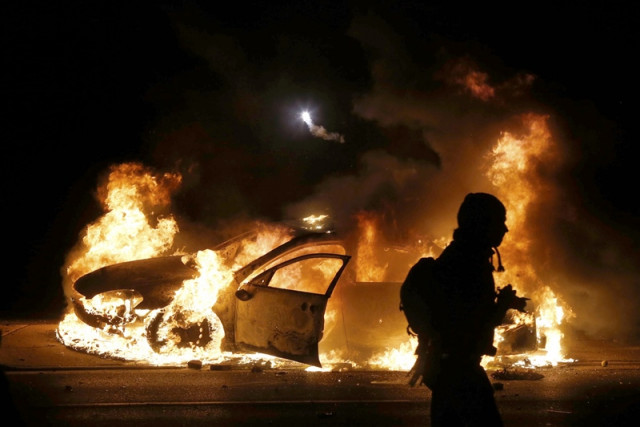Ferguson & some lessons for us
Pakistanis have plenty to relate to the protests in terms of the injustices they face, both current and historical

It is also perhaps, difficult for Pakistanis to relate to those tensions; Pakistan has neither a comparable history nor an analogous racial divide that could perhaps give shape to those tensions in the US. But Pakistanis not caring, or worse, taking satisfaction in the US’s troubles would be a grave moral and strategic error. First, we do not have to be black or American to empathise with the oppressed. Human rights, by definition, encompass all of mankind, and a violation of those rights anywhere is a violation everywhere.
Second, Pakistan (indeed, the entire subcontinent) has gone through centuries of oppression and subjugation under colonial masters. Our ancestors were also put on ships and transported across the world to unfamiliar lands in Africa and the Caribbean; we were also robbed of our dignity, wealth and livelihoods. We also lived under oppressive laws and that legacy of subjugation is still very much with us today, in our legal system and in our collective image of ourselves. Our own history compels us to extend our empathy to those who also continue to suffer. All of this also precludes the very real racial tension in Pakistani society. The emphasis on fairness — whether it is for marriage proposals or even job interviews — and our own disdain towards darker skinned individuals who live in this country, whether from abroad or our very own, ought to give us plenty to consider. Those racial tensions, as in America, also have socio-economic undercurrents.
There is also another aspect to the protests that Pakistanis would do well to consider: the rights and constraints of the police force. It is not safe to travel in cities late at night, not only because of criminals, but also because of police harassment. Arbitrary detention, arrests, and even killings, are routine in Pakistan, and especially after the Pakistan Protection Bill was passed by both the Senate and the National Assembly, codified by law. No, Pakistan’s police force is not ‘militarised’, they tend to be woefully ill-equipped, but that issue is mitigated by a wide array of para military law-enforcement agencies whose accountability is murky at best. ‘Encounters’ in which ‘suspects’ are killed by the police are hardly investigated at all, let alone effectively; the cries of the families of those killed, ignored. Citizens of this country have long become used to a corrupt, unaccountable police force that preys on the citizens it is appointed to protect and serve. Unsurprisingly, the poor suffer the most.
Pakistanis, then, have plenty to relate to the protests in terms of the injustices they face, both current and historical. And even if they did not, they should perhaps consider what it means to be allies, which Pakistanis admirably become when it comes to the rights of Palestinians or Kashmiris. Yes, of course we have our own troubles; there is plenty of persecution, terror and oppression to go around. But that should not limit our hearts to be open to ourselves alone. The world is more inter-connected than it ever was before, and as a consequence, it is a lot smaller. It is about time we thought of others in it.
Published in The Express Tribune, December 14th, 2014.
Like Opinion & Editorial on Facebook, follow @ETOpEd on Twitter to receive all updates on all our daily pieces.













COMMENTS
Comments are moderated and generally will be posted if they are on-topic and not abusive.
For more information, please see our Comments FAQ